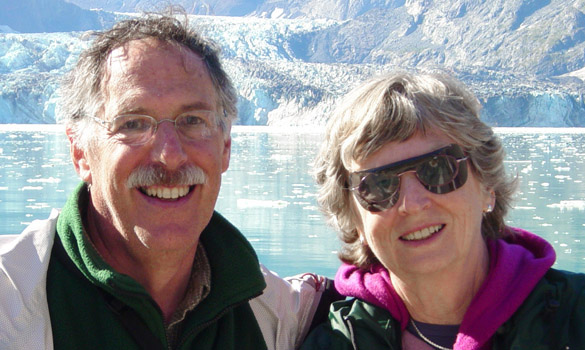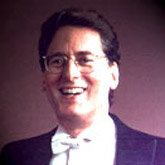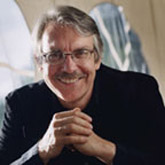Harbison concert to honor Institute Professor Peter Diamond

Peter and Kate Diamond
Premiere of work by Institute Professor John Harbison
A concert by pianists Robert Levin and Ya-Fei Chuang will feature the premiere of a new work for two pianos by Institute Professor John Harbison. The piece, Diamond Watch, was commissioned by Priscilla (Kate) Myrick Diamond as a birthday present for economist and Institute Professor Peter Diamond in honor of his retirement from MIT.
The concert, which is free, will take place in Kresge Auditorium on Friday, April 30, 2010 at 8 pm.
The concert program will also feature: Stravinsky, Sonata for Two Pianos (1944); Rachmaninoff, Suite for Two Pianos No. 2, Op. 17; Lutoslawski, Variations on a Theme of Paganini for Two Pianos; Poulenc, Sonata for Two Pianos; Harbison, Diamond Watch: Double Play for Two Pianos (FIRST PERFORMANCE) and Harbison, David’s Fascinating Rhythm Method (arr. for two pianos). Admission is free and the public is invited. The event is sponsored by the MIT Music and Theater Arts Faculty Concert Series.
About Peter Diamond
Diamond received his B.A. in Mathematics from Yale in 1960, his Ph.D. in Economics from MIT in 1963, and was a faculty member at the University of California - Berkeley for three years before joining the MIT faculty in 1966. Diamond was named the Paul Samuelson Professor of Economics at MIT in 1992, and appointed an Institute Professor in 1997. He received MIT's Killian Award in 2003. Diamond is a past president of both the American Economic Association and the Econometric Society, and a member of the U.S. National Academy of Sciences. He has received numerous professional awards, including the Robert Ball Award from the National Academy of Social Insurance (2008), the Nemmers Prize from Northwestern University (1994), and the Mahalanobis Memorial Award from the Indian Econometric Society (1980).
Concert Program
Robert Levin & Ya-Fei Chuang, piano
Stravinsky, Sonata for Two Pianos (1944)
Rachmaninoff, Suite for Two Pianos No. 2, Op. 17
Lutoslawski, Variations on a Theme of Paganini for Two Pianos
Poulenc, Sonata for Two Pianos
Harbison, Diamond Watch: Double Play for Two Pianos (FIRST PERFORMANCE)
Harbison, David’s Fascinating Rhythm Method (arr. for two pianos)

About Robert Levin
Pianist Robert Levin has performed throughout the United States, Europe, Australia and in Asia, appearing with the orchestras of Atlanta, Berlin, Birmingham, Boston, Chicago, Cleveland, Detroit, Los Angeles, Montreal, Utah and Vienna on the Steinway and with the Academy of Ancient Music, the English Baroque Soloists, the Handel & Haydn Society, the London Classical Players, the Orchestra of the Age of Enlightenment and the Orchestre Révolutionnaire et Romantique on period pianos. Renowned for his improvised cadenzas in Classical period repertoire, Robert Levin has made recordings of a wide range of repertoire for Deutsche Harmonia Mundi, DG Archiv, Decca/London, ECM, Hänssler, New York Philomusica, Philips, and SONY Classical.
His recordings include Bach's complete keyboard concertos, the six English Suites and both books of the Well-Tempered Clavier (Hänssler Edition Bachakademie); a Mozart concerto cycle with Christopher Hogwood and the Academy of Ancient Music for Decca/Oiseau Lyre; and the Beethoven concertos with Sir John Eliot Gardiner and the Orchestre Révolutionnaire et Romantique for DG Archiv. A passionate advocate of new music, Robert Levin has commissioned and premiered a large number of works, including Joshua Fineberg's Veils (2001), John Harbison's Second Sonata (2003), Yehudi Wyner's piano concerto Chiavi in mano (Pulitzer Prize, 2006), Bernard Rands' Preludes (2007) and Thomas Oboe Lee's Piano Concerto (2007).
Robert Levin appears frequently with his wife, pianist Ya-Fei Chuang, in duo recitals and with orchestra, and with violist Kim Kashkashian. A noted Mozart scholar, Mr. Levin's completions of Mozart's Requiem, C-minor Mass and other unfinished works have been recorded and performed throughout the world. After more than a quarter century as an artist teacher at the Sarasota Music Festival he was made Associate Artistic Director in 2004 and succeeded Paul Wolfe as Artistic Director in 2007. A member of the American Academy of Arts and Sciences and the Akademie für Mozartforschung, he is President of the International Johann Sebastian Bach Competition (Leipzig, Germany).
In addition to his performing activities, Robert Levin is a noted theorist and Mozart scholar, and is the author of a number of articles and essays on Mozart. A member of the Akademie für Mozartforschung, his completions of Mozart fragments are published by Bärenreiter, Breitkopf & Härtel, Carus, Peters, and Wiener Urtext Edition, and have been recorded and performed throughout the world. Levin’s cadenzas to the Mozart violin concertos have been recorded by Gidon Kremer with Nikolaus Harnoncourt and the Vienna Philharmonic for Deutsche Grammophon and published by Universal-Edition. Henle has issued his cadenzas to the flute, flute and harp, oboe, horn and bassoon concertos and to the Beethoven violin concerto. His reconstruction of the Symphonie concertante in E-flat major for four winds and orchestra, K.297B, was premièred by the Vienna Philharmonic Orchestra at the Mozartwoche in Salzburg, and has subsequently been performed worldwide. The first of the many recordings of the work, by Philips, won the 1985 Grand Prix International du Disque.
In August 1991 Robert Levin’s completion of the Mozart Requiem was premièred by Helmuth Rilling at the European Music Festival in Stuttgart, Germany, to a standing ovation. His completion of the Mozart Mass in C minor, K. 427, commissioned by Carnegie Hall, was premiered by Rilling in New York in January 2005 and in Europe two months later. Both works have been performed worldwide and are published by Carus-Verlag.

About Ya-Fei Chuang
Piano Faculty Boston Conservatory of Music
Ya-Fei Chuang earned an artist diploma with honors at Musikhochschule Freiburg (Germany) under the instruction of Robert Levin. Chuang also completed a soloist exam (final performance degree) at Musikhochschule Cologne with Pavel Gililov and a graduate diploma at the New England Conservatory with Russell Sherman. She has performed at the Spectrum Concerts (Berlin) and the Boston Celebrity Series, and at major festivals including the Gilmore, Ravinia, Sarasota, Oregon, Tanglewood, Beethoven Festival with Christoph Eschenbach, European Music Festival (Stuttgart), Schleswig-Holstein, Bach (Leipzig) and Ruhr Festival (Germany).
She has also performed in venues such as Boston's Symphony Hall, Jordan Hall, Ozawa Hall, Cologne and Berlin Philharmonien, Schauspielhaus Berlin, Gewandhaus Leipzig and National Philharmonic Hall Warsaw. Chuang has partnered with Kim Kashkashian, Robert Levin and Steven Isserlis for duo performances, and has played chamber music with members of the Berlin Philharmonic, Philadelphia Orchestra and Boston Symphony Orchestra. Chuang recently performed with the Handel and Haydn Society, City of Birmingham Symphony Orchestra and in South America and Asia. A CD of her solo work was released worldwide with the July 2007 issue of FonoForum Magazine. Four recordings of additional work will soon be released.

About John Harbison
Recent major premieres include Leonard Stein Anagrams (PianoSpheres), Mary Lou (Pittsburgh Youth Symphony), and The Seven Ages (a Koussevitsky commission for the New York New Music Ensemble and the San Francisco Contemporary Music Players), French Horn Suite (Boston, MA), A Clear Midnight (Pro Arte Singers), Winter’s Tale (BMOP, complete revised version), Symphony No. 5 (Boston Symphony Orchestra), The Great Gatsby Suite (Aspen Festival Orchestra), Cortège (New England Conservatory), Milosz Songs (New York Philharmonic with soprano Dawn Upshaw), Concerto for Bass Viol (for fifteen major orchestras), But Mary Stood (Cantata Singers), and the sinfonietta Umbrian Landscape (Chicago Chamber Musicians). The 2009-10 season will see first performances of a double concerto for violin and cello (Boston Symphony), and Diamond Watch, for two pianos (Boston). Harbison’s present composition projects include a setting of texts by Alice Munro for voice and orchestra (for the Metropolitan Opera Orchestra), his fifth string quartet (for the Pro Arte Quartet), and a work for violin and piano (Music Accord).
Mr. Harbison has been composer-in-residence with the Pittsburgh Symphony, the Los Angeles Philharmonic, the American Academy in Rome, and numerous festivals, including Tanglewood, Marlboro, and Aspen. He received degrees from Harvard and Princeton before joining the Massachusetts Institute of Technology, where he is currently Institute Professor, the highest academic distinction offered resident faculty. He is Acting Artistic Director of Emmanuel Music (Boston), co-Artistic Director of the Token Creek Chamber Music Festival, and has just completed a thirteen-year term as President of the Copland Fund. Harbison’s music is published exclusively by Associated Music Publishers. A complete works list can be found at www.schirmer.com.

About Diamond Watch
Diamond Watch was fun to write, a piece for an occasion I envisioned as enjoyable, with cherished performers, attentive listeners, and a location I’ve grown to love even for its acoustics, Kresge Auditorium at MIT.
The dedicatee, Peter Diamond, is one of the world’s sovereign economists, but his other interests include baseball. I got to thinking about the various intersections between games, statistics, musical shapes, rules, frames, and predictions, and began imagining a series of variations.
In my favorite kind of variation the “theme” itself is not overtly stated. This is the idea of the baroque passacaglias: the bass and its harmony are the real source. Bach’s Goldberg Variations and his solo violin Chaconne proceed this way, as does Corelli’s La Folia.
I have previously written shadow-theme variations on a large scale, for violin, clarinet and piano, and quite brief, in my second piano sonata (for Robert Levin). This one is somewhere between those in duration, about twelve minutes. The movement titles offer a heavy hint as to the origin of the ground.
One amusing aspect of the piece more available to the performers than the listeners is the graphic representation of diamonds in the variation called “Diamond daze.” I think of it as an analogy to the representation of the dedicatees as part of the composition in Renaissance paintings and, as such, an acknowledgement of Kate Diamond’s keen participation in the conception of this project (Kate was for many years a Curatorial Associate at the Museum of Fine Arts, Boston).
Diamond Watch was commissioned by Priscilla (Kate) Myrick Diamond as a birthday present for Peter Diamond, and in honor of his retirement from the Massachusetts Institute of Technology, for a first performance by Robert Levin and Ya-Fei Chuang at Kresge Auditorium on April 30, 2010.
Diamond Watch: Double Play for Two Pianos
2. Taking a pitch
3. Low and inside
4. High and outside
5. On deck circle
6. Making contact
7. Stealing a base
8. Diamond daze
9. Ahead on the count
10. Swinging for the fences
11. Stroking a hit
12. Walkoff
played without substantial pauses
— John Harbison
